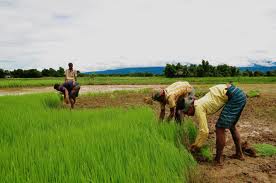Nigeria’s Minister of Agriculture: Sustainability and Growth in Investments from Private Sector, but Banks Overcharge

Dr Adewunmi Adeshina
The expected gains of the N450billion Nigeria Incentive-Based Risk-Sharing System for Agricultural Lending (NIRSAL) special credit portfolio set aside by the Central Bank of Nigeria is yet to be seen due to high interest rates pegged on it by banks, the Minister of Agriculture and Rural Development, Dr Adewunmi Adeshina has said.
Speaking at the inaugural meeting of the Nigeria Agribusiness Group (NAG), Adeshina said research carried out by the Agric Ministry and stakeholders have revealed that NIRSAL was yet to function proper and discharge its purpose due to the high interest rate pegged on it by banks allotted to disburse the funds to farmers.
He lamented that the high interest rate has continued to obstruct its aim of establishment as the credit risk guarantee and interest drawback fund programme operated by the CBN to stimulate agricultural financing and trigger the nation’s agricultural industrialisation process.
“Meanwhile, the Managing Director of Dizengoff West Africa Limited, Mr Richard Hargrave at the forum said that agricultural sector in the country may not grow the way it should due to lack of funds for farmers.”
Hargrave said it would impossible for any farmer to survive with high interest rate, adding that because farming is a capital intensive business, fund has been one of the biggest challenges to farmers and until this was resolved Nigeria could not prosper in food sufficiency.
He said the passion and zeal shown by the Minister of Agriculture Dr Adesina to revive the agriculture sector was highly commendable but that much would not come out of it without the private sector driving the process.
However, the Minister disclosed that the Global Financial Institutions had endorsed the establishment of staple crop processing zones in the country, which according to him would attract private sector investment in the industry. According to Adesina, the development partners rallied around Nigeria’s agricultural transformation efforts with commitments, totaling $2 billion, including the World Bank with $1 billion, AfDB with $500 million, USAID with $100 million, the International Fund for Agricultural Development with $100 million, and funds from DFID, UNDP and the Bill and Melinda Gates Foundation.
Adesina also said that the private sector to the agricultural transformation agenda in Nigeria had tremendously increased within the last 18 months, adding that the sector was able to attract $8 billion of private sector investment commitments into the agriculture sector, from local and multinational companies. The minister urged stakeholders in the agricultural sector to advocate and drive policies that would ensure the success and sustainability agric investment in the country. “The Nigerian Agribusiness Group (NABG) will help to drive accelerated investments in the agricultural sector and advocate for policies and incentives that will ensure success and sustainability of the agricultural transformation agenda.
The expected gains of the N450billion Nigeria Incentive-Based Risk-Sharing System for Agricultural Lending (NIRSAL) special credit portfolio set aside by the Central Bank of Nigeria is yet to be seen due to high interest rates pegged on it by banks, the Minister of Agriculture and Rural Development, Dr Adewunmi Adeshina has said.
Speaking at the inaugural meeting of the Nigeria Agribusiness Group (NAG), Adeshina said research carried out by the Agric Ministry and stakeholders have revealed that NIRSAL was yet to function proper and discharge its purpose due to the high interest rate pegged on it by banks allotted to disburse the funds to farmers.
He lamented that the high interest rate has continued to obstruct its aim of establishment as the credit risk guarantee and interest drawback fund programme operated by the CBN to stimulate agricultural financing and trigger the nation’s agricultural industrialisation process.
Meanwhile, the Managing Director of Dizengoff West Africa Limited, Mr Richard Hargrave at the forum said that agricultural sector in the country may not grow the way it should due to lack of funds for farmers.
 Hargrave said it would impossible for any farmer to survive with high interest rate, adding that because farming is a capital intensive business, fund has been one of the biggest challenges to farmers and until this was resolved Nigeria could not prosper in food sufficiency.
Hargrave said it would impossible for any farmer to survive with high interest rate, adding that because farming is a capital intensive business, fund has been one of the biggest challenges to farmers and until this was resolved Nigeria could not prosper in food sufficiency.
He said the passion and zeal shown by the Minister of Agriculture Dr Adesina to revive the agriculture sector was highly commendable but that much would not come out of it without the private sector driving the process.
However, the Minister disclosed that the Global Financial Institutions had endorsed the establishment of staple crop processing zones in the country, which according to him would attract private sector investment in the industry. According to Adesina, the development partners rallied around Nigeria’s agricultural transformation efforts with commitments, totaling $2 billion, including the World Bank with $1 billion, AfDB with $500 million, USAID with $100 million, the International Fund for Agricultural Development with $100 million, and funds from DFID, UNDP and the Bill and Melinda Gates Foundation.
Adesina also said that the private sector to the agricultural transformation agenda in Nigeria had tremendously increased within the last 18 months, adding that the sector was able to attract $8 billion of private sector investment commitments into the agriculture sector, from local and multinational companies. The minister urged stakeholders in the agricultural sector to advocate and drive policies that would ensure the success and sustainability agric investment in the country. “The Nigerian Agribusiness Group (NABG) will help to drive accelerated investments in the agricultural sector and advocate for policies and incentives that will ensure success and sustainability of the agricultural transformation agenda.
You may have an interest in also reading…
Shareholder Value: Outdated and an Obstacle to Corporate Success
The pursuit of increased shareholder value is much overrated, may hurt corporations and is certainly not the legal requirement some
UNCDF: Women as Builders of Inclusive Digital Economies
The dramatic toll of the COVID-19 pandemic, at times, seemingly defies belief. Yet, every time there is an analysis of
The Economics of Valentine’s
As consumer spending and seasonal sentiment increasingly drive market dynamics, Valentine’s Day continues to be a crucial date for retailers


















































































